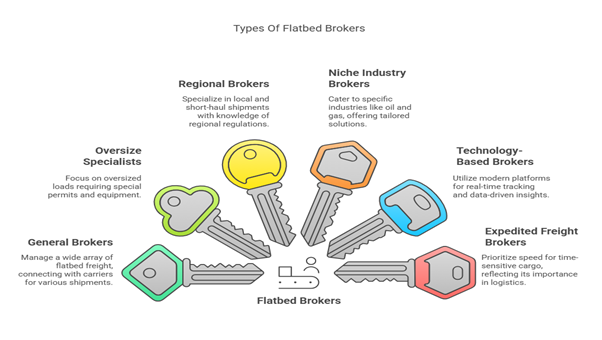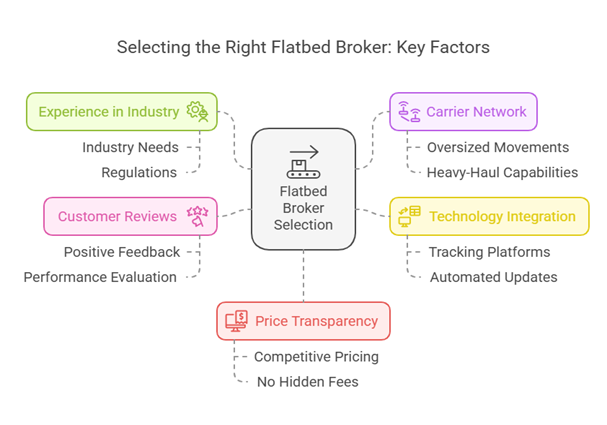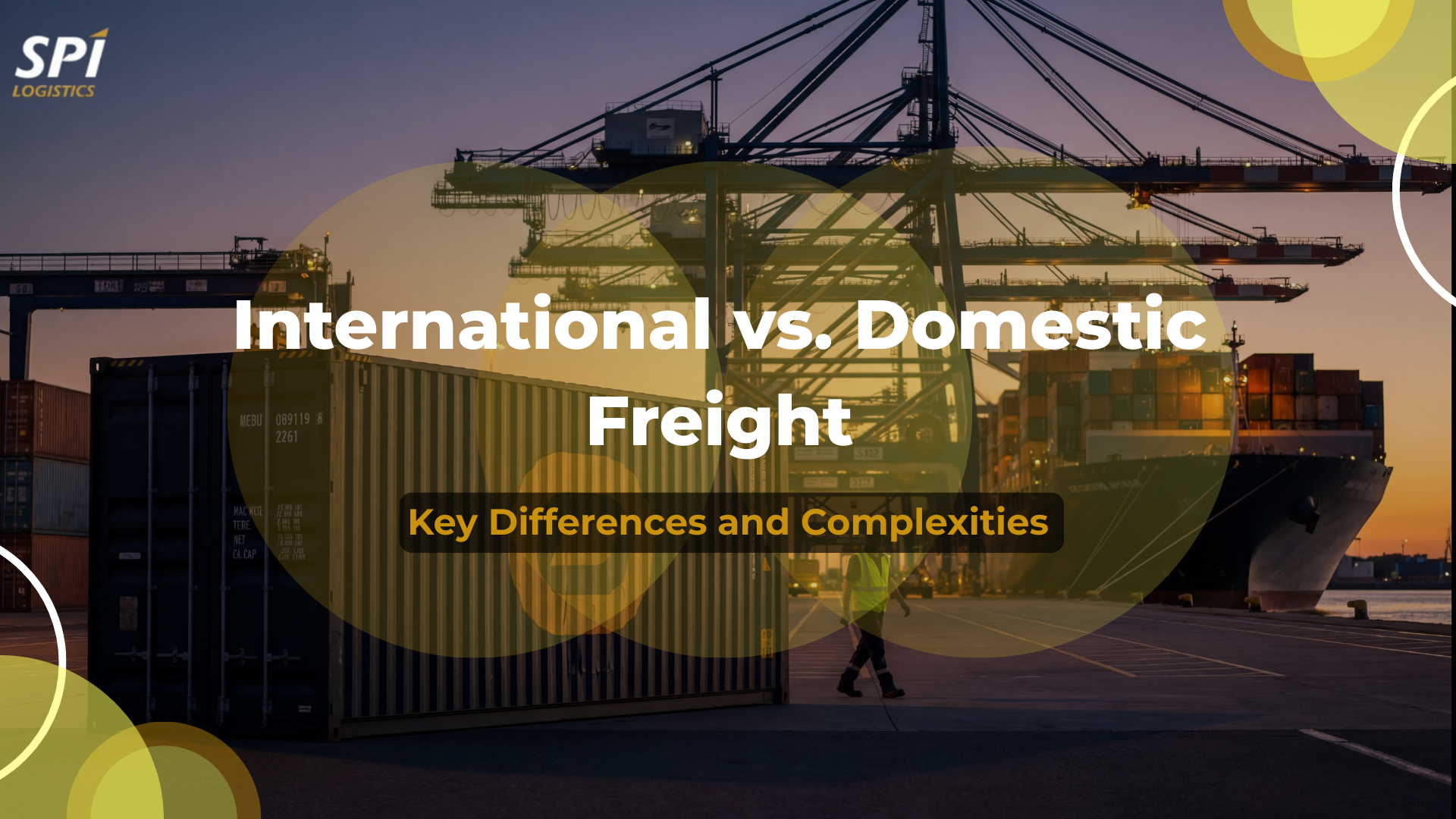Flatbed shipping activity continues to evolve in 2026, with spot rates and load volumes responding to broader market shifts. Industry data shows that flatbed spot rates have increased year-over-year while load-to-truck ratios have remained elevated compared to prior years, indicating continued strength in demand despite rate volatility. Recent freight market reports noted that national average flatbed spot rates (excluding fuel surcharges) rose above $2.06 in March 2025 and were up roughly 6% YoY, while load-to-truck ratios were close to 42.1, significantly higher than year-ago levels. This reflects ongoing tightness in capacity and strengthened negotiation power for brokers operating in competitive lanes. However, navigating the complexities of flatbed logistics can be daunting without the right partner. That’s where flatbed brokers step in.
As flatbed freight market trends continue to shift, brokers must navigate flatbed spot rates, capacity constraints, and fluctuating freight demand to keep shipments moving efficiently. This guide explores everything you need about flatbed brokers, their benefits, available types, and practical tips for selecting the best one for your business.
What Is a Flatbed Broker?
A flatbed broker is a logistics professional who arranges freight transportation that requires flatbed trailers. The trailers are most suitable for carrying oversized, heavy, or unusually shaped cargo, like construction equipment, steel beams, or machinery.
Core Responsibilities of Flatbed Brokers:
• Carrier Matching: Matching shippers with carriers that have the equipment and technical expertise.
• Regulatory Compliance: Permit management and assurance of compliance with state and federal shipment regulations.
• Efficient Route Planning: Reducing transit times and costs by selecting optimal routes.
• Real-time Update: Shipment tracking and timely communication to the shippers.
In 2023, flatbed freight accounted for 15.8%of all trucking revenue in the United States, emphasizing its role in transportation (American Trucking Associations [ATA], 2024).
“Flatbed brokers play an essential role in reducing complexity for shippers while optimizing logistics processes for specialized freight.”
Types of Flatbed Brokers
Current flatbed market trends show that long-haul loads have increased in some periods while rate pressure continues in medium and short hauls, illustrating shifting demand patterns across freight distances. For example, long-haul load counts rose by more than 5% in summer 2025 even as average per-mile rates declined slightly in certain segments. These shifts emphasize the importance of choosing a flatbed broker with diverse carrier options and dynamic pricing strategies.
Flatbed brokers offer specific services that handle a wide range of shipping needs for customers.
1. General Flatbed Brokers
They can manage a wide array of flatbed freight, from standard equipment to construction materials. Versatile and all, they connect you with carriers moving both oversized and standard shipments.
Example: A construction company needing to transport steel beams and scaffolding across multiple job sites would benefit from a general flatbed broker’s broad carrier network.
2. Oversize Load Specialists
These brokers specialize in dealing only with oversized or heavy loads that require special permits and equipment. They have acquired experience handling regulatory problems and any compliance matters from the state or federal governments.
Example: Shipping large machinery of cranes or turbines often requires an oversized load specialist.
3. Regional Flatbed Brokers
Regional brokers specialize in a particular area and are good to go for both local and short-haul shipments. They have vast knowledge of regional regulations and carrier networks.
Example: A farm equipment manufacturer based in Texas looking to ship machinery to regional states would hire a regional flatbed broker knowledgeable not only with the local transportation laws but also the geography.
4. Niche Industry Brokers
Some brokers may also focus on oil and gas, agriculture, or renewable energy-related industries; hence, they understand the specific requirements of those industries and offer appropriate solutions.
Example: A renewable energy broker might be involved in the logistics of wind turbine parts.
5. Technology-Based Flatbed Brokers
Brokerage companies, through technology, apply modern platforms to match shippers with carriers effectively. Real-time tracking, immediate quoting, and data-driven insights have eased shipping many folds.
Example: An e-commerce company opening physical retail locations might utilize a technology-driven broker to automate scheduling and track the delivery of store fixtures.
6. Expedited Freight Brokers
For urgent shipments, expedited flatbed brokers prioritize speed and ensure that time-sensitive cargo reaches its destination immediately. Expedited freight accounts for 15% of flatbed shipments annually, reflecting its importance for industries like manufacturing and energy (Logistics Market Insights, 2024).
Example: A power plant facing a critical equipment failure would rely on an expedited flatbed broker to deliver replacement parts within the timeframe, minimizing downtime.

“Each flatbed broker type is tailored to different shipping needs. Whether oversized freight or expedited deliveries, the right broker can significantly reduce shipping complexities.”
How do you think the type of freight you’re shipping impacts your choice of a flatbed broker? Can a specialized broker offer a distinct advantage?
Benefits of Using Flatbed Brokers
The following are the benefits of partnering with flatbed brokers, which shippers can measure:
1. Specialized Carriers
Flatbed brokers sustain networks of carriers that embody particular expertise or equipment.
- Shippers who use brokers report a 12% improvement in delivery times thanks to better carrier selection (DAT Freight & Analytics, 2024).
2. Regulation Compliances
The movement of oversized freight will often require permits and be subject to strict regulations. Flatbed brokers manage these complexities on behalf of the shippers.
3. Cost Savings
Brokers can use relationships with multiple carriers to broker more competitive rates.
- Flatbed brokers save companies shipping oversized loads an average of 18% in transportation costs.
4. Increased Visibility
Advanced tracking tools have made the facilitation of tracking freight in real time a reality for the shippers.
- 72% of flatbed brokers now use GPS-enabled tracking systems, offering shippers increased visibility and control over their loads (Transport Topics, 2024).
As of late 2025, flatbed rates have seen mixed movements depending on freight type and distance. Industry spot market analysis shows that flatbed loads and rates have exhibited resilience, with certain haul types experiencing increased activity and stable pricing despite broader freight volatility. These patterns underscore the role brokers play in smoothing market fluctuations by securing competitive rates and access to capacity.
“Partnering with the right flatbed broker can drastically improve shipping efficiency, from securing permits to ensuring that your load is transported with minimal risk of damage.”
Ready to optimize your flatbed shipping? Contact us to explore how our brokers can streamline your logistics today.
How Flatbed Brokers Solve Common Freight Challenges
1. Permit Requirements Management
Challenge: Moving oversized loads without the proper permits may lead to costly fines.
Solution: Flatbed brokers secure permits and ensure that each load complies with all state and federal regulations.
Example: In 2023, 40% of fines for flatbed freight violations were related to incomplete permits, highlighting the importance of broker expertise (FMCSA, n.d.).
2. Mitigating Freight Damage Risks
Challenge: Improperly secured loads are susceptible to damage during transport.
Solution: Brokers pair shippers with carriers with experience securing complicated loads.
Example: A flatbed broker placing an order with a company that moves industrial pipes might ensure the carrier selected has experience using cradle systems and tie-down methods to prevent the pipes from shifting or rolling during transport, reducing the risk of damage or accidents.
This approach minimizes the risk of freight damage and enhances customer confidence by ensuring reliable and secure delivery.
3. Handling Market Fluctuation
Challenge: Flatbed freight volatility, driven by seasonal demand, construction cycles, and capacity constraints, makes broker-led capacity planning essential for consistent service.
Solution: Brokers help shippers lock in their rates and manage the pricing volatility. In 2025, national spot market rates for flatbed freight have fluctuated but remained generally healthy relative to other equipment types, with flatbed volumes increasing in select periods even when overall load posting trends were below five-year averages. This demonstrates that brokers who maintain diversified carrier networks and real-time market insights can better manage seasonal variability and rate pressure.
Example: Flatbed freight rates increased by 10.2% year-over-year in 2023, driven by higher fuel prices and limited carrier availability (FreightWaves, 2024).
“Seasonal demand fluctuations and rising fuel costs are major factors in flatbed shipping, but brokers help mitigate these risks by locking in rates and optimizing routes.”
What are some of the most common challenges you’ve faced with flatbed shipping, and how did you address them?
How to Choose the Right Flatbed Broker
The right flatbed broker will determine how smooth and efficient the whole shipping process is. Here are the key factors to consider before making your choice:
1. Experience in Your Industry
When searching for a broker, ensure they have previously dealt with your particular industry or freight type. This will assure you that the broker is aware of the specific needs and regulations of your goods, which further includes using special equipment or handling procedures.
Example: A construction materials broker will be further trained to handle cargo such as lots of steel beams or outgoing concrete forms.
2. Carrier Network
This needs to be robust and reliable. Your broker must have relationships with carriers with flatbed capabilities, including oversized and heavy-haul movements.
Example: Brokers with access to specialized carriers are the best options for moving wind turbine components or oil rig equipment.
3. Integration of Technology
Real-time tracking, automated updates, and the use of platforms simplify the shipping process. Such tools enhance transparency and help you monitor your freight at every stage.
Pro Tip: Find a broker that offers a platform that will let you track your shipment and give notifications instantly if it is running behind or changes take place.
4. Customer Reviews
Check reviews and testimonials to evaluate the reliability and performance of a broker. Positive feedback about service provided from past clients can be a good indicator of their quality.
5. Price Transparency
Choose brokers that have competitive pricing and are very transparent about the same. Such hidden fees are a sure way of inflating the costs and frustrating users. A good broker will always show their expenses’ breakdown and give detailed itemized quotes.
Pro Tip: Request a breakdown of the fees to know precisely where your money goes.

“Choosing a broker isn’t just about price. It’s about aligning with a partner who understands your industry’s unique needs and has the right tools to help you succeed.”
Are you looking for a flatbed broker that fits your needs? Get in touch with us today to explore how we can help.
Flatbed Market Trends & What They Mean for Brokers
Flatbed freight dynamics in 2025 reflect a combination of tight capacity and changing demand across haul types. According to industry spot market data, flatbed spot rates have experienced gradual increases YoY, while load-to-truck ratios have remained elevated compared to prior years, signaling sustained demand for flatbed capacity. Market demand indices show flatbed freight often driving overall load activity, even when other equipment types lag, suggesting brokers with strong flatbed expertise can capitalize on these trends.
Key trends to note:
- Spot rates excluding fuel surcharges have climbed above $2.00 per mile in parts of 2025, marking one of the stronger periods for flatbed pricing.
- Load-to-truck ratios rose significantly YoY in early 2025, though levels sometimes remain below the longer-term averages — a sign of periodic tightening and loosening in capacity.
- Long-haul flatbed freight continues to see resilient load counts, even when shorter haul segments experience slight rate pressure.
These trends reinforce the value of strategic flatbed carriers and brokers who can adapt to shifting market conditions with flexible routing and pricing tools.
Take Control of Your Flatbed Shipping Today
Flatbed brokers simplify the complexities of flatbed freight, ensuring cost savings, compliance, and efficiency. Whether you’re shipping construction materials or oversized machinery, these experts provide the tools and resources needed to optimize your operations.
Ready to partner with a flatbed broker? Start exploring solutions tailored to your freight needs today!
References
American Trucking Associations. (2024). Trends in U.S. freight transportation. Retrieved from https://www.trucking.org
DAT Freight & Analytics. (2024). The state of flatbed freight. Retrieved from https://www.dat.com
Federal Motor Carrier Safety Administration. (n.d.). Oversized load regulations. Retrieved from https://www.fmcsa.dot.gov
Freightquote. (n.d.). How brokers save shippers money. Retrieved from https://www.freightquote.com
FreightWaves. (2024). Flatbed freight market analysis. Retrieved from https://www.freightwaves.com
Logistics Insights. (2024). Trends in expedited freight shipping. Retrieved from https://www.logisticsinsights.com
Transport Topics. (2024). Advancements in flatbed freight technology. Retrieved from https://www.ttnews.com




